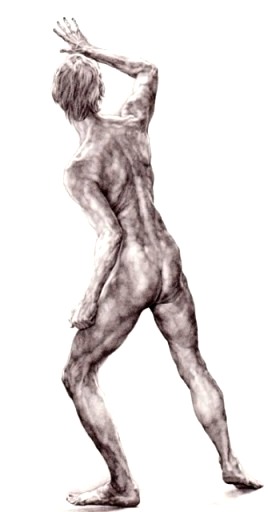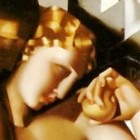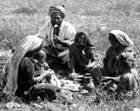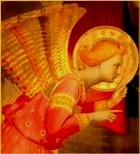Adam: first man
Eat the fruit, said the serpent
 Adam: the first human being. His name means ‘that man’ or ‘human being’, but is also close to the word for soil or dirt – ‘adamah‘.
Adam: the first human being. His name means ‘that man’ or ‘human being’, but is also close to the word for soil or dirt – ‘adamah‘.
Eve: the first woman
Cain, Abel and Seth: sons of Adam and Eve
The Serpent/Snake: the personification of Evil; in ancient pagan religions it could be a symbol of fertility (in humans, vegetation and the Earth) or healing.
The creation of Humans
On the sixth day in the story of Creation, God created the first human being, – Adam.
This creature was made in God’s image: but what does that mean?
That he was by nature impelled to create, to look at what he saw and change it, even if sometimes the changes did not work out well.
Mankind/people had creativity and imagination locked into their souls.
God made Adam/mankind master over the earth and all that was on it. Then he created Woman, telling her and Adam to be fruitful and multiply.
God’s command
God told Adam that he could eat from any tree in the Garden of Eden, except one. This was the Tree of Knowledge of Good and Evil – if Adam ate from that, he would die.

All was well in Paradise, and the man and the woman were happy.
Until the serpent came to tempt them. ‘Eat the fruit’ said the serpent. ‘Why not?’
Read Bible Text Genesis 2:4-25
Adam and Eve disobey God
 Eve was intrigued by this question – a temptation in disguise. The fruit would make her wise, she hoped. So she took one piece from the Tree of Knowledge, ate it and offered some to Adam. He ate it too.
Eve was intrigued by this question – a temptation in disguise. The fruit would make her wise, she hoped. So she took one piece from the Tree of Knowledge, ate it and offered some to Adam. He ate it too.
Suddenly everything changed. They became aware of their nakedness for the first time. They felt shame – a new sensation for them.
In their confusion they hid from the presence of God. But God called to them: “Where are you?” They knew they were caught.
Instantly, they began to blame each other. Adam blamed Eve for offering him the fruit. Eve blamed the serpent for tempting her.
 But the deed had been done, and they now faced the consequences, which were terrible – God sent them from the Garden, and an angel with a flaming sword barred the entrance so Adam could never return.
But the deed had been done, and they now faced the consequences, which were terrible – God sent them from the Garden, and an angel with a flaming sword barred the entrance so Adam could never return.
Read Bible Text Genesis 3:1-14
Life in the real world
Life would never be the same. Adam was sentenced to a life of toil. There would never again be food without work. Adam must labour hard and long to get food, fighting infertile ground full of thorns and thistles. The sweat of his brow would be the price he paid for bread.
Eve would share his fate, and suffer the pangs of childbirth, as would all future women.
The pain did not end there. Adam had sons, Cain and Abel, but when they grew they fought together, as nations would fight each other. In one violent struggle Cain killed his brother. The first murder.
Then God took pity on Adam’s misery and gave him another son, Seth, who was just like his father in every way…
Read Bible Text Genesis 3:15-24 , 4:1-25
Symmetry in the Garden Story
Genesis 2.4-4.1
You may not have noticed the careful design of the poetry of Genesis 2-4. Look at it carefully to see the masterly construction of this great Poem of Creation:
A Headnote: “These are the generations . . .” (2.4)
B No field economy: “. . . no one to till the ground” (2.5-6)
C Human beings given life, installed in Garden (2.7-17)
D Man prefers human companionship over beasts (2.18-22)
E Man calls his companion “Woman” (2.23)
F Etiological summary: “Therefore a man leaves . . .” (2.24)
G Human couple “naked and … not ashamed” (2.25)
H Serpent promises “eyes will be opened” (3.1-5)
I Transgression (3.6)
H The couple’s “eyes are opened” (3.7a)
G They experience shame (3.7b-10)
F Etiological summary: “For … you are dust . . .” (3.19b)
E Man calls his companion “Eve” (“Life-bearer”) (3.20)
D Man and woman wear skins of beasts (3.21)
C Humans expelled from Garden, denied immortality (3.22-24)
B Field economy begins (implied; see subsymmetry and 3.23b)
A Birth of a child completes one generation (4.1)
Sub-symmetry in the Garden Story
X God questions man; man points to woman (3.11-12)
Y God questions woman; woman points to serpent (3.13)
Z (Serpent is silent)
Z’ God passes judgment on serpent (3.14-15)
Y’ God passes judgment on woman (3.16)
X’ God passes judgment on man (3.17-19a)
© Copyright 2006
Elizabeth Fletcher











